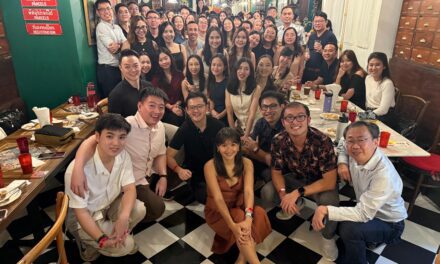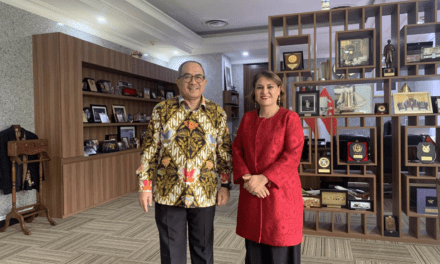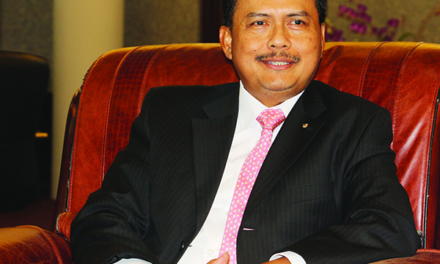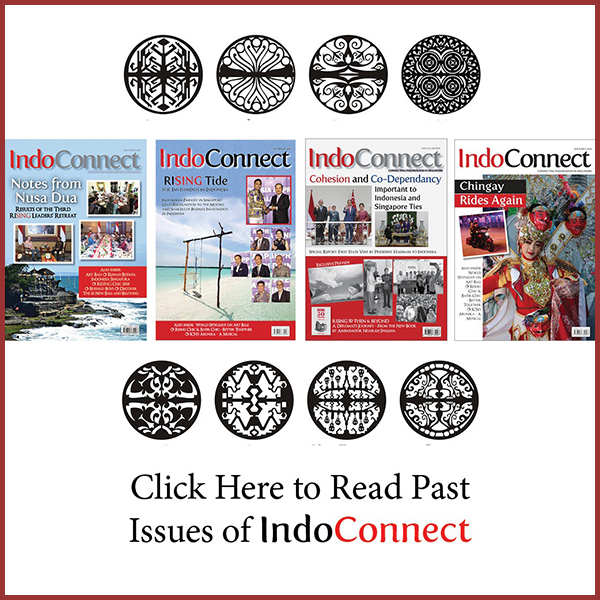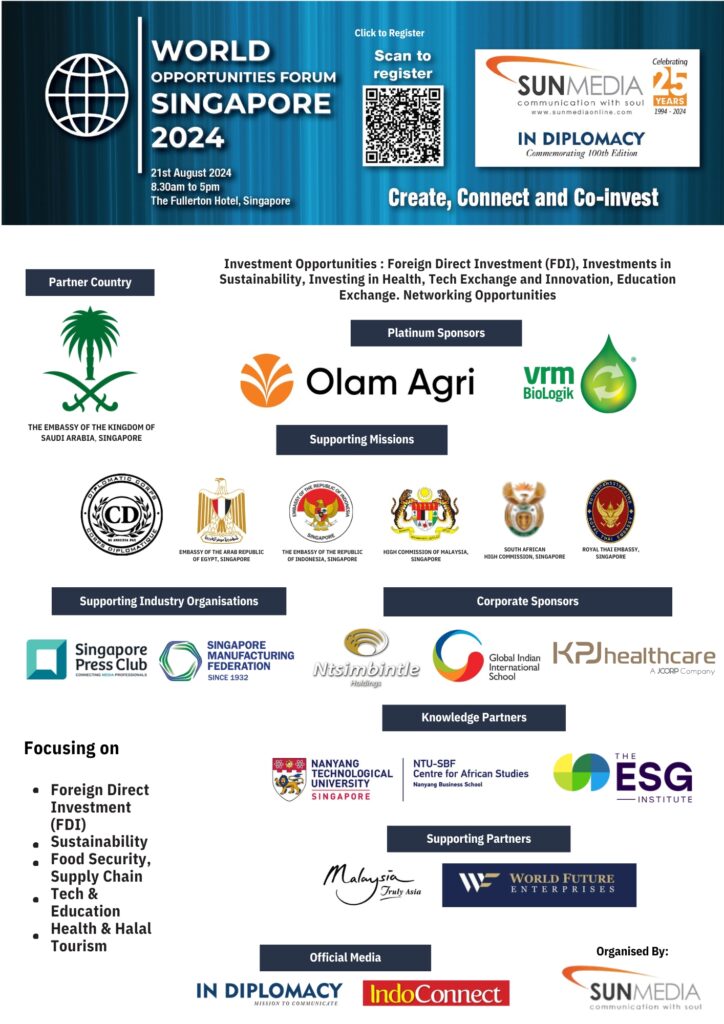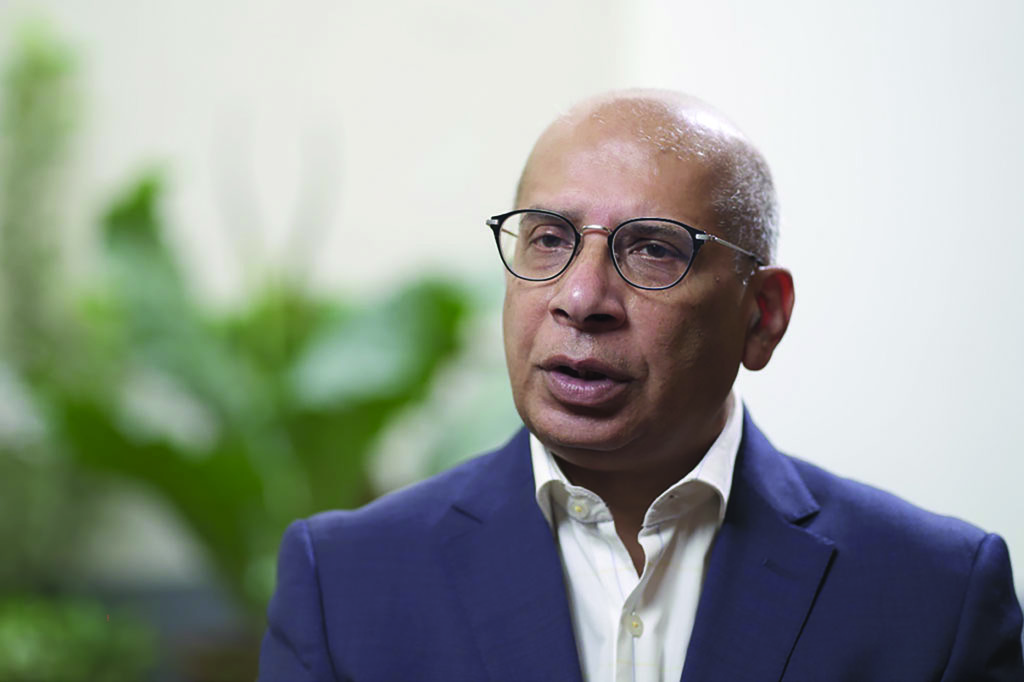
Shoeb Kagda, the Chairman of the Singapore Chamber of Commerce in Indonesia, and Director of the Singapore Management University Overseas Centre, Jakarta, in conversation with Nomita Dhar. Shoeb has been based in Indonesia for 25 years. He started as a journalist and now he helps Indonesian – Singaporean businesses and students to multiply opportunities
SHOEB Kagda’s background has been in the media and he explained that he came to Indonesia in 1998 primarily to cover the then political and economic crisis and was widely reporting on Indonesia. Later he started his own media consulting company. He also owns the platform called Indonesia Economic Forum that brings together various stakeholders. He says he loves Indonesia and as a Singaporean he also felt that it is his primary duty to help explain Indonesia to the outside world.
According to Mr Kagda, over the past 25 years, Indonesia has moved from a centralized autocratic economy to a democratic decentralized economy! It is the fourth largest democracy in the world and he feels in the last 25 years there has been a rise of a very dynamic middle class which is driving progress in many different areas. Consumer spending has increased and is expected to grow further in the areas such as education and health care.
Mr Kagda oberves, “Indonesia also has one of the largest startup economies and digital ecosystems in the world. And all of it is being driven not only by the middle class but also a very young dynamic population. Sixty percent of the population is under 35. So it has a huge runway for growth.”
He also thinks that increasingly Indonesians are also getting much more outward-looking.
Upon probing on how Indonesia is engaging with the world Mr Kagda replied, “Indonesia now walks on the global stage with a bit more spring in its step. Recently it hosted the G20 and this year it is the Chair of ASEAN. So it has come a long ways since 1998. It is not just on the business side, one can also see it being manifested in culture, music and diplomacy.”
The Chamber, he shares organizes networking sessions as well as leadership programmes. It also participates in many economic and business forums and also works with the Indonesian government. It helps Singapore companies do two things: One, of course, to give them the lay of the land and what is going on here – what are the growth sectors; new regulations that may have been introduced etc. Secondly, it tries to help them to network with potential joint venture partners, across many sectors. So as a Chamber it acts as a bridge between the business communities on both sides. It also works very closely with the Embassy of Singapore in Indonesia, Enterprise Singapore and the EDB.
“Indonesia also has one of the largest startup economies and digital ecosystems in the world. And all of it is being driven not only by the middle class but also a very young dynamic population. Sixty percent of the population is under 35. So it has a huge runway for growth.”
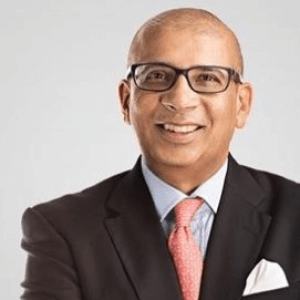
First Step for Businesses
Mr Kagda hopes that any Singapore business organisation contemplating entry into the Indonesian market takes the first step by becoming a member of the Singapore Chamber of Commerce in Indonesia. He is happy to share that after they complete and send in the membership form they become part of the ecosystem of the Chamber. The Chamber has a dynamic, very well experienced council that is selected every year. The council members are all volunteers who give their time and share their knowledge with members.
Mr Kagda meets many young Singaporeans who come into the Chamber personally. His advice to the new entrants is to join the Chamber so that they can be part of many networking opportunities. Periodically they also invite senior Indonesian government leaders to address the members.
Mr Kagda is also well placed to provide some indicators of where are the most active sectors in the Indonesian economy that are attracting investors. His thoughts on this subject was that they have seen a huge influx of young investors and businesses. For the big companies it is easy to do their own due dilligence and can manage on their own. The Chamber is especially catering to the needs of startup founders, young entrepreneurs and SMEs looking to venture into Indonesia. Many of the Singapore startups have come with ideas and products for the Indonesian market. There is growth in areas such as logistics, edutech, fintech and health tech. In the future especially the sectors with potential are relaed to sustainability and carbon exchange credits. In the traditional sectors like agriculture and plantation, Singapore companies can find a niche. Even plantations and retail companies are in the need of digitalization. Singapore companies, especially SMEs and startups can also play a very critical role as service providers to the food and beverage sector. Tourism sector most definitely still remains huge.”
Involvement in Indonesia Mr Kagda feels has to be long term. His advice to newcomers is “You really have to invest yourself in the country. You must like the country. If you are only coming with the thought that you are only going to make money and then go back. Then it doesn’t work. When you come here you must firstly invest yourself in the country not money. Then you will start to understand the country and then do business right. I think it is something that we need to learn whether it’s Indonesia or Thailand or China or India. Invest first your time to learn about a country.”
One area potential investors might be interested to know about Indonesia is the level of participation by women in the economy. He said, “Indonesian women are actually very empowered. You do not see any systemic downgrading of women. In fact, many companies are run by women. More women are also now coming into the professional fields. There are many women entrepreneurs and I don’t think they need any help. Also, you’ll be surprised by the number of women who are startup founders .”
With the national days of both countries being celebrated in August Mr Kagda leaves the conversation with these thoughts on the relationship between Singapore and Indonesia. He felt that they both have much reasons to celebrate: “Singaporeans can be proud that we have built up a nation from really nothing and is well recognised for it all around the world as well as famous for its efficient business culture. Indonesia is recognised for its achievements as a democracy and as one of the fastest growing economies in the world. It’s also famous for its diversity in terms of culture and natural heritage. But I think more importantly both countries should also be celebrating our friendship and closeness. These include the social and cultural links, the business links, and, of course, the economic links. Indonesians and Singaporeans need each other like family members like siblings and we should celebrate that!”

